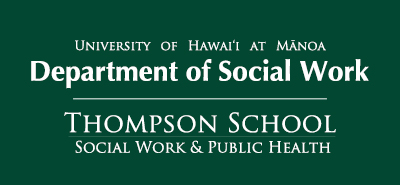Social Work Profession
The social work profession is committed to the realization of individual and collective well-being through the advancement of social justice, the provision of effective programs and services, and the enhancement of individual and family development. The primary responsibility of social workers is to the most vulnerable groups and individuals.
Social work views differences among people as enriching the quality of life for all and places positive value on varying perspectives provided by race, ethnicity, gender, age, and other characteristics. Social work seeks to enhance opportunities for individuals, especially those who have historically been oppressed, to reach their maximum potential, while at the same time, working to change oppressive systems in society.
Social work is practiced in a wide variety of settings. These range from hospitals and clinics, schools, public welfare departments, and family and child welfare agencies to counseling agencies, mental health clinics, gerontology and geriatric programs, and immigrant/refugee centers. The societal mandate of social work is to be prepared to intervene at various levels: with individuals, families, and groups; with organizations and communities; and with broader levels of government focusing on resource development and social policy change.
Career Opportunities
The BSW program prepares students for beginning level professional social work practice in the public and private sector – including governmental agencies dealing with health, social and public welfare, courts, and corrections; as well as programs dealing with chemical dependency, the elderly, immigrants and refugees, high-risk youth, the homeless, and families. Graduates have also pursued careers in other related areas, such as: law, school counseling, and urban planning.
The MSW program prepares students for advanced professional social work practice with children and families, and in health, mental health, gerontology, and other areas. Career opportunities include practice, policy and program planning, research, and other leadership positions in public or private agencies. Graduates of the school have careers in social work in Hawai‘i, other states, and other countries. Our Distance Education MSW option focuses on educating and training professional social workers for practice on the neighbor islands.
The PhD program prepares students for leadership in social work education, research and the field of social welfare.
The school offers notice of position openings for its students and the community. Career employment sessions are held each year for graduating students.
International Dimensions
The geographic location of the University and the East-West Center’s close ties with the University afford opportunities for understanding of international social welfare. Cross-cultural aspects of social welfare, particularly those pertaining to Asian countries and the Pacific Basin, are included in courses and symposia in the Thompson School and in other parts of the University. The school also undertakes partnerships with schools and other organizations in Asia and the Pacific.
Towards Indigenization
The faculty and staff at the Thompson School of Social Work & Public Health continue to work towards building the School’s standing as a leader in the advancement of indigenous social work education. These efforts have been supported by community leaders, social service agencies, students, practicum instructors, kūpuna and many others who see its relevance to Hawai‘i and the Pacific Asian Region. Defining indigenization has been a collaborative work-in-progress.
The term indigenization has elicited feelings of (re)empowerment among faculty, and working between these impassioned viewpoints has highlighted the need for us to be thoughtful in how we align what we do with the values and beliefs embedded within Native Hawaiian culture while simultaneously reflecting on a deeper and richer appreciation of all the diverse ethnic perspectives represented in Hawai‘i today. Indigenization involves a process of re-examining, re-orienting and decolonizing our perspectives in order to be more culturally inclusive, relevant, and contextual. Indigenization gives relevance to local knowledge that in turn shapes new ideas, concepts, theories, and model of practice. A key mission of the School is to generate, transmit, and apply knowledge. In this regard, indigenization is about inclusiveness and an appreciation for all knowledge sources that affirm holistic well-being. Our goal has always been to produce competently trained, culturally-versed, adaptable students capable of working anywhere in the world and we recognize that indigenization is an important requisite to fulfilling this realization. As we continue to define and redefine indigenous social work, we are encouraged by the emergence of positive synergies and great potential as we integrate western science and technology, indigenous knowledge, research methods, human spirituality, and intellectual creativity to the greatest extent which further strengthens our commitment to the people of Hawai‘i and the broader Pacific Asian Region.
